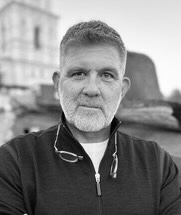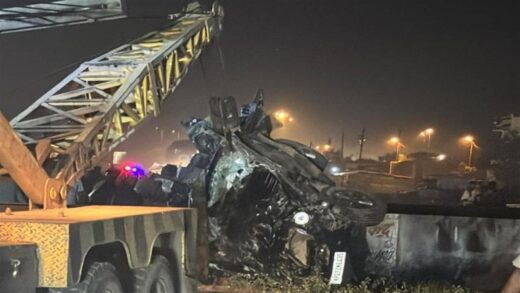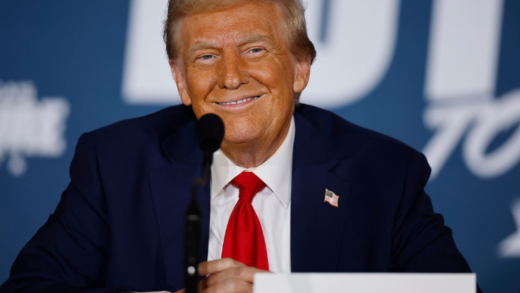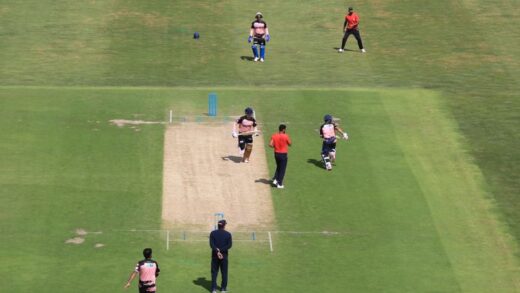BOTTOM LINE UP FRONT — Russia’s war against Ukraine has – once again – reached a pivotal moment. Russia has launched a new offensive in the northeastern Kharkiv region, a push that has forced Ukraine’s military to retreat from some areas and establish new defensive positions. With its latest advances, Russia has seized more territory since April than Ukraine liberated in its lackluster 2023 counteroffensive.
Ukraine maintains it is holding its own. President Volodymyr Zelensky described the fighting in Kharkiv as “very difficult” but “under control.” He and other Ukrainian officials say Kyiv is rushing to reinforce its northeastern front to prevent further Russian advances. And General Christopher Cavoli, commander of U.S. European Command and NATO Supreme Allied Commander, expressed confidence in Ukraine’s ability to hold the line, saying that Russia lacks sufficient troops and capability for a strategic breakthrough in Kharkiv.
“I tend to agree with people who think this is some sort of Russian feint to draw Ukrainian forces from other parts of the front,” former senior CIA Officer Ralph Goff told The Cipher Brief. “I think there’s a danger for the Russians too, that if they try to resort to maneuver warfare in an area where they can’t hide behind prepared defenses, I could see the Ukrainians marshaling adequate forces…I really don’t see them in an all-out drive on Kharkiv anytime in the future.”
But Goff and other Cipher Brief experts warn that the Kharkiv offensive and other Russian advances along a 600-mile front are straining Ukraine, which is low on manpower and military equipment and also suffering the impact of regular Russian attacks on critical infrastructure.
The silver linings for Ukraine? The first deliveries from the U.S. $60.8 billion aid package, and strikes that have hit Russian targets in Crimea and deep in Russian territory as well.
In a special Ukraine briefing, Goff and two other former senior CIA Officers, Glenn Corn and Paul Kolbe — all of whom participated in The Cipher Brief’s Kyiv Economic and Security Forum in April — considered these developments and offered reflections on the state of the war. They spoke with Cipher Brief Managing Editor Tom Nagorski.
THE CONTEXT
- Russia has launched a new offensive into Ukraine’s northeastern Kharkiv region. Ukraine’s military has retreated to new defensive positions, and thousands of Ukrainians have evacuated border settlements in the area.
- President Vladimir Putin said Russian forces are advancing “in all directions” in Ukraine and working to create a buffer zone in the Khrakiv region. President Volodymyr Zelensky said the situation in Kharkiv “remains extremely difficult. We are reinforcing our units.”
- Ukraine reimposed power rationing after a series of Russian strikes against the power system.
- The first elements of the U.S. $61 billion package of military aid for Ukraine have been delivered.
- Ukraine continues strikes on military infrastructure and energy facilities within Russia to undermine Russia’s military movements and war economy.
- Putin replaced defense minister Sergei Shoigu with Andrei Belousov, an economist.
THE BRIEFING
Paul Kolbe
Paul Kolbe is former director of The Intelligence Project at Harvard University’s Belfer Center for Science and International Affairs. Kolbe also led BP’s Global Intelligence and Analysis team supporting threat warning, risk mitigation, and crisis response. Kolbe served 25 years as an operations officer in the CIA, where he was a member of the Senior Intelligence Service, serving in Russia, the Balkans, Indonesia, East Germany, Zimbabwe, and Austria.

Glenn Corn
Glenn Corn is a former Senior Executive in the Central Intelligence Agency (CIA) who worked for 34 years in the U.S. Intelligence, Defense, and Foreign Affairs communities. He spent over 17 years serving overseas and served as the U.S. President’s Senior Representative on Intelligence and Security issues. He is an Adjunct Professor at the Institute of World Politics.

Ralph Goff
Ralph F. Goff is a 35 year veteran of the CIA where he was a 6-time “Chief of Station” with extensive service in Europe, the Middle East, and Central and South Asia including several war zones. As a Senior Intelligence Service Executive he was Chief of Operations for Europe and Eurasia responsible for all CIA activities and operations in dozens of countries. Ralph was also Chief of CIA’s National Resources Division, working extensively with “C Suite” level US private sector executives in the financial, banking, and security sectors.
This excerpt of the briefing has been lightly edited for brevity and clarity.
The Cipher Brief: Let’s start with the shakeup in the Kremlin. For years there was talk that defense minister Sergei Shoigu might lose his job. Now it’s happened, just as Russia gets some battlefield momentum, and in comes an economist, Andrei Belousov, to replace him. Were you surprised by the news?
Goff: I’m never surprised by anything that comes out of Moscow, although I will admit to some surprise at the choice. Belousov is a technocrat. He’s got experience with the economic portfolio and the military industrial complex. So he’s actually a good choice by Putin, a very pragmatic choice. The Russian economy has been retooled to be primarily based on military production, but that doesn’t do anything to help the civilian economy. So it appears that Belousov is a smart choice if you’re looking to either transition the military economy over to the civilian economy, or if you’re looking for a way to minimize the negative impacts of having a military-based economy.
Kolbe: I think it reflects two things. One, it’s an acknowledgement that this is going to be a long war that’s not going to be won immediately on the battlefield. And second, that the key to this war is not necessarily on the front line right now, but on who’s got the best tactics and who’s got the best, strongest, fastest, most creative, innovative defense industrial base. And that’s where Belousov will be particularly useful. He knows the economy, he’s got Putin’s trust and he has a mandate to innovate and to try to adapt.
We’ve already seen that the Russian military is an adaptive and learning organization. They’re becoming much more effective in how they implement their attacks and coordinate them than they did at the start of the war. If Russia is able to get to the point where they’re as quick, as fast, as precise as Ukraine, it’s difficult news (for Ukraine).
The Cipher Brief: Speaking of difficult news, in the month since you were all in Kyiv with our delegation, “difficult news” is about the way to describe it from the Ukrainian perspective. And in terms of battlefield momentum, Russia has it at the moment – taking some territory, not much, but territory doesn’t move much in this war. And there’s also a regular pummeling of Ukrainian infrastructure, energy in particular. How do you assess the ground state of the war?
Corn: The Ukrainians predicted this when we were in Kyiv. Pretty much everyone we spoke to said that the Russians were preparing for offensive operations before we resolved the issue of continued aid and assistance. So we saw this coming, the Ukrainians saw it coming. The Russians are trying to take advantage of an opportunity before the bulk of the assistance in this latest package gets to the Ukrainian forces.
In terms of the energy infrastructure, it is tragic what the Russians are doing. It should be a reminder to us of how they wage war. When we were there, we met with officials from DTEK, the main energy provider. They told us 80% of their infrastructure had been damaged. What I heard from multiple sources there was that the Russians were now striking targets with great accuracy, which said that they had very good intelligence, probably on the inside, which should be worrisome.
The Cipher Brief: Ralph, I know you stayed on in Ukraine and went to Kharkhiv after the Cipher Brief trip. We know it’s the second-largest city, a lot of kinetic activity there a couple of years ago. Help us understand what you’re hearing of the lay of land there now.
Goff: It’s been serious. While I was there they were getting hit during the day. They were getting hit during the night. And it was all indiscriminate civilian targets, nothing military whatsoever. And when you drive around downtown Kharkiv, rare was the building that didn’t have shattered windows, that didn’t have debris. The downtown area in particular, where the government buildings were, was particularly hard-hit in the opening phases of the war. Now the Russians can hit them at will, they are able to launch air attacks, glide bombs, drones, missiles. I visited five or six sites that had been hit, the electricity had been knocked out, the water had been knocked out.
The irony is that Kharkiv after World War II, during Soviet times, was known as a hero city because of the defense they put up against the Nazi onslaught. We visited battlefields outside the city that had seen fights between the Germans and the Soviets in the 1940s – and now fights between the Ukrainians and the Russians. The city was very proud of how they withstood the Nazi onslaught and they’re still proud of how they’re withstanding the Russian onslaught.
So it’s a proud city. And everyone I talked to says if the Russians are dumb enough to attack again, they’ll drive them back. So there’s a lot of bravado and hubris there, but backed up by hard experience as well.
I tend to agree with people who think this is some sort of Russian faint to draw Ukrainian forces from other parts of the front, and here I think there’s a danger for the Russians too, that if they try to resort to maneuver warfare in an area where they can’t hide behind prepared defenses, I could see the Ukrainians marshaling adequate forces using Bradley’s, M-1s, Leopards (tanks) and the like to really inflict pain on them. So I’m sure the Russians are aware of that. I really don’t see them in an all-out drive on Kharkiv anytime in the future.
The Cipher Brief: It’s tough sometimes to read the situation in that region. There were reports that Russia has taken more territory in the last few weeks than it has since the early part of the war, which sounds dramatic. Others point out that when you actually add up the kilometers or even just meters, it really doesn’t add up to much.
Goff: Well, it’s kind of hollow bragging on the side of the Russians. They’re pushing down from the Russian border into areas that were not prepared with defenses in depth. It’s kind of like a buffer zone. The Ukrainians will yield them that territory. Yes, it stings Ukrainian pride a bit, but at the end of the day, lives right now are more precious than land, when you look at the manpower mismatch. So in this case, the Russians can brag all they want, but if they try anything serious here again, I think the Ukrainians have an opportunity to inflict really heavy casualties. So I don’t think we’ll be seeing any armored columns racing down the roads to Kharkiv anytime soon.
The Cipher Brief: Let’s turn to the U.S. aid, the $60.8 billion that finally cleared the Congress. Is any of the aid already helping the Ukrainians, or will it sometime soon?
Corn: Right after the aid package was approved, I was at a meeting that the Ukrainian Prime Minister was at here in Washington, and I spoke with some members of the delegation and I mentioned it’s going to take time to get that aid to the Ukrainian forces. And they all said the same thing; that the sign itself is what’s most important to us, morale-wise. It’s going to be a big boost. It already is, because we know that you haven’t abandoned us. People were beginning to second guess our commitment and our stamina to stand with them against Putin. And so it was very good that we did it.
In terms of the systems, my understanding is that some of the equipment we’ve given them already has been helpful and I’m sure that once the bulk of the supplies get there, they will help shore up Ukrainian defenses and maybe give the Ukrainians the ability to counterattack in some areas and take back some of the territory that they’ve lost. What’s happening now is Putin’s trying to get as much territory as he can before he goes to the negotiation table and he wants to negotiate from a position of strength.
The Cipher Brief: We learned in the past few weeks that a shipment of ATACMS missiles had gone to Ukraine before the vote, I guess somewhat surreptitiously, and there have been reports that the Ukrainians have quickly put these to good use, at least a few of them. Why was this missile system so high on the wishlist for Ukraine – and what do you know about how it’s been used thus far?
Kolbe: It’s a long-range system, which is important. It can make it more difficult for Russia to mass forces close to the front. So when they mass a bunch of armor and they mass a bunch of personnel, that becomes vulnerable and it looks from open-source reporting that the intelligence is pretty good. Just within the last week there was a large formation of (Russian) trainees that was taken out. I’m not sure if it was ATACMS or not, but it would be a signature of that kind of strike.
So this will make it more difficult (for Russia) to punch through lines and take a lot of ground. And if they do mass the forces to do that, then they become vulnerable. The ATACMS change the Russian calculus for what and where and when they can do it.
Goff: I think if you’re a Ukrainian commander, you’re looking to leverage those, but at the same time, a big problem I see are the Russian glide bombs. These are what used to be dumb bombs that have been fitted out with kits so that they can be launched with some precision guidance. And these things have made a huge tactical difference along the Ukrainian front. And when they’re used against the troops, not only are they effective, but they demoralize the troops that they hit. And when they’re used against civilians, I mean it’s like doubling down on terror.
The Cipher Brief: I want to turn to manpower. That’s one area where of course there’s not much a U.S. aid package can do, but I recall, Glenn, you made the point after the trip that one knock-on impact of getting the American aid through was that Ukrainians might be more likely to sign up for the fight if they knew that they’re going to have the stuff to fight with.
Corn: They made it clear that it’s very hard to motivate people to go fight when there’s no weapons or ammunition to use on the front line. They said, We didn’t really have a recruiting problem early on, when we had the equipment we needed. And we’ll have to see now whether this will help them fill a gap that they’ve had in terms of forces to counter the Russians.
The Cipher Brief: While you were in Ukraine, a bill passed to lower the conscription age from 27 to 25. And a lot of people here asked, Wait a minute, Ukraine is all in for the fight – and yet if you’re under 25 you’re not part of the draft? What’s the history of this and why is it so controversial to change?
Goff: In the beginning, this was just the Ukrainians trying to protect their youth for the future. Now, we’ve all heard that the average age at the front is something like 43, which is jaw-dropping. They’ve been preserving their kids, so in that way Ukraine is not “all in”. You have a population of 40 million, but only about a million are directly involved in the war. So the demographics of course favor Russia, but in this case, dropping the age from 27 to 25 opened the manpower pool up, but not by much.
All Ukrainian young men have to register, but they don’t serve unless they’re 25 or older. And I think the downside to this, aside from limiting the manpower pool, is you get a lot of Ukrainians who say, We’re not going to negotiate with the Russians until we take back all our land and get back to the borders of 1991. Well, I think a lot of those people might change their mind if their 19-year-old or 20-year-old kids are faced with going to the front. When you have skin in the game, all of a sudden the idea of negotiations seems a little bit more palatable. So while I sympathize and understand the Ukrainian goal of protecting their kids, I think at the same time there’s a political cost here that just makes the situations around the negotiations that much more complicated.
The Cipher Brief: Paul, after the trip last month, you said that the Ukrainians have to prepare for “a defensive year.” That was before the aid package came through. Do you think that remains the necessary posture for the country, even with the aid?
Kolbe: I do. I think that 2024, will prove to be a year of Ukraine playing defense. But what the aid package means is that they can play defense in a way that significantly degrades the Russian forces. I don’t see Russia wanting to have just static warfare. They want to go on the offensive, they’re massing for it, they’re building capability for that. But if those offensives are decisively defeated with high casualty rates, that will significantly improve Ukraine’s prospects for a negotiation on its own terms.
The Cipher Brief: Speaking of defensives and offensives, there are at least two areas where Ukraine has had some success with offensive, asymmetric activities. One is the Black Sea, and the other, these strikes hitting increasingly deeper into Russia. Whatever limitations the U.S. has imposed on strikes on Russian territory, the Ukrainians are going ahead. Are these just irritants to the Russians, or more than that?
Goff: These are more than just irritants. They’ve already had a heavy impact on Russian oil and gas production in spite of the complaints of the U.S. administration to knock it off. The Ukrainians have found something that works and they’re going to just continue. They’re going to double down where they can. So I think the potential for these attacks to be even more significant on a strategic level, it’s there. Driving the Black Sea fleet away from the Ukrainian shoreline has done a lot to ensure that those lanes remain safe for the time being. And the strikes on economically important targets or on airfields have a morale effect on the Russians that I think can’t be underestimated.
Corn: In terms of the Black Sea, it’s opened up the grain corridor. It’s opened up exports for the Ukrainians, which has been critical, so good on the Ukrainians for doing that. As for the strikes inside Russia, what the Ukrainians told us is that they have a specific goal. They’re going after aviation fuel. They’re going after Russia’s ability to supply its Air Force with the ability to inflict pain on the Ukrainians.
Kolbe: I think that these attacks also have to be looked at in context of sanctions. These strikes are a fantastic complement to sanctions. If you burn a barrel of oil at the source, that’s a barrel that’s not going to be bought by India or China, and every barrel of refined product that gets burned or not produced means the equivalent of a hundred bucks or so that’s not going into the Russian War machine. So I think these are critical attacks, both for the physical impact of the revenue impact and for the morale impact.
The Cipher Brief: What are the key things that you’ll be looking at, in the next weeks, months, rest of this year?
Goff: I would say it’s all in the battlefield, and no political settlement is possible until both sides feel it’s in their best interest to negotiate. So it remains for each side to figure out what that means. And the onus is still on our own administration to clearly enunciate what the policy is going forward, so that once we do face the next round of negotiations for the next aid package, there’s got to be a clear policy goal there.
Kolbe: One thing to look ahead to is the NATO summit in Washington this summer. Ukraine is going to be looking again for some sign of commitment. I think the politics around it are unfortunately not going to lead to the firm language that I would like to see. I believe that the war won’t end for good until Ukraine is in NATO or has the equivalent of 38,000 troops on the 38th parallel (as in Korea). So the NATO summit and how we deal with building consensus for what real security guarantees for Ukraine following the end of fighting – that’s a critical next step.
Corn: I’m looking at political unity in Kyiv, in Ukraine. Zelensky’s ability to maintain the kind of unity that he needs to continue to fight this war, with the Russians very actively trying to split that nation.
And with the NATO summit, I’m very interested to see if the Turkish president comes to that summit. We should not forget, he just canceled his trip here. It’s not exactly clear why, but there’s some indication that it has to do with Gaza and U.S. policy, and we’ve got to watch that. I’m sure the Russians are smacking their lips right now that he did not come. And we want to make sure that we don’t lose the second-largest standing military in NATO, which is an important partner. So I’m very interested to see if he comes here in July.
Read more expert-driven national security insights, perspective and analysis in The Cipher Brief because National Security is Everyone’s Business.
Source link
#Russian #Gains #U.S #Aid #Kremlin #Shakeup #State #Ukraine #War


















